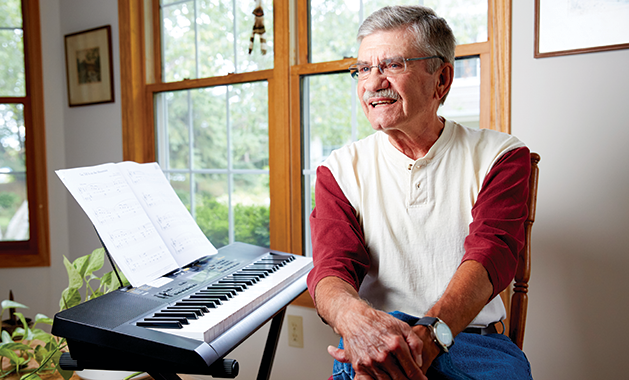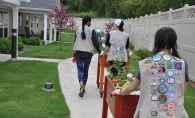
Dave Nimmer has led a busy life. His decades-long career in media included jobs at the Minneapolis Star (back before it became the Star Tribune) and WCCO, in addition to teaching journalism at the University of St. Thomas. Now retired, he is as active as ever—volunteering with a group of nuns in north Minneapolis, spending time with loved ones and both learning new skills like the piano and practicing old ones like writing. From his home in Woodbury, Dave shared his background and how he stays both busy and balanced through the golden years.
What was your first job in journalism?
When I got out of the University of Wisconsin-Madison, I got a job at the Minneapolis Star—they were hiring anybody that could fog up a drinking glass! So, I got to town when I was 22 year old… and I started as a suburban reporter for the Star, went around covering the suburbs. I had the south suburbs, but I could barely find them. I had no idea how to get to Coon Rapids or Hopkins. I took a lot of wrong turns and got to meetings a little late and then tried to figure out what was going on…. This was a great lesson in civic journalism. I did that for six months, and then I got placed on the cop beat.
Thinking back to your early days as a journalist, are there any stories that still stand out? One of the first stories that I did was about the murder of a young woman. They found her body at the bottom of a toboggan slide. I was late in getting to the scene, because I didn’t know my way around town yet. So, I got to the scene of the crime in Minnehaha Park, and her body—her name was Mary Bell [and] she was a babysitter—was at the bottom of the hill.
Since I was late, I thought the easiest way to do this was to walk down the toboggan hill. I had brought a trench coat so I’d look older, and I had a hat, because otherwise I looked like I was 13 years old. So, I had some copy paper folded up to take notes, had my hat on and my trench coat, and I started walking down this toboggan path, and I fell and started to slide…. And I fell all the way down to the bottom of the hill… right through part of the crime scene.
There were cops standing there, and I’m on the ground sliding into the scene, and the homicide cop looked at me and said, “And who the hell might you be?” I told him that I was Dave Nimmer from the Minneapolis Star, and he asked how long I’d been with them. I said about a week, and he said, “Would you like to live to make it two?”
It wasn’t a great, inauspicious start to my career as a cop reporter, but it was memorable for me.
How are you staying active in retirement?
I’m spending more time on stuff that I didn’t before. My friend Don Shelby and I hiked to the bottom of the Grand Canyon about two years ago, and I spend a lot of time hiking out here [in Woodbury]. I’m listening to music. I’ve got a keyboard, and I’m going to learn how to play. I can play “Amazing Grace,” and I’m not great, but I’ll get there.
I serve on the board of a group of nuns on the north side [of Minneapolis] called Sisters of the Visitation. I did a story about a couple of these women before I left WCCO. Four of them—one from Minneapolis and three from St. Louis—decided that they wanted to be in a community and ended up in north Minneapolis. They’ve got two houses over there now, and they’ve been there for 28 years. They’re a presence, but more than that, they serve the needs of an incredible number of people whether of the spirit or the soul or the day or the mind or the body—they are there. These women are really remarkable. I do essentially whatever they tell me to do. Sometimes they ask me to run errands, and sometimes I write profiles, which gives me a chance to practice my craft.
I also write a monthly column for a seniors’ magazine, Minnesota Good Age, which also gives me a chance to write. I volunteer sometimes at Stonecrest Assisted Living down on Radio Drive. There’s a group of women in a writers group and they write short stories. I go over there, and we compare stories.
I’m also a member of Memorial Lutheran Church in Afton and recently got involved in the Islamic Society of the East Metro’s [new mosque]. I want to be a part of that relationship, because I think it’s going to be really important at some point in time—I know it will, and I want to be as much of a part of a welcoming committee as I can be.
What do you like about living in Woodbury?
I’ve been living here in this townhouse since 2008, and it’s a nice place. I’m on the association board, and I’m learning a lot about government that I didn’t know before. Being on a governing body, it’s not easy. The people here are very nice. I like living in Woodbury—this is a good place. I thought it was a bland community, but it’s not. It’s much more diverse than I thought. And they set aside a lot of public land—there’s a lot of open space in this town, and I like that.
What have you learned since retiring?
When you get to be this age, you ought to spend more time living in the moment, not worrying about what you did last week or what you’ve got on your plate a month from now. That doesn’t come easily to me. I’m trying to learn to say, “Let me live in this moment, let me do this, be here one moment at a time.” And so if I can do that, I can get there. I’ve made my share of mistakes, and I’m not ashamed of what I’ve done, but I try to learn from my mistakes and see if I can’t do it a little better the next time. That’s it. That’s where I’m at. I’m not getting any taller, and I’m not getting any faster, but hopefully I’m getting a little wiser.
I don’t want to be an old man dreaming of days that never were. I think this part of life is a spiritual journey for me. The questions are existential and the answers aren’t obvious. I don’t want to be obvious. The broad question is, “Why am I here, and what am I supposed to be doing?” And I think at the base of that is that I’m supposed to be of service to whomever asks…. I’m trying to be a good friend to the people in my life, so that when they have some needs, I can be there. And I think that wasn’t first and foremost among my needs when I was working. I loved what I was doing, and I spent a lot of time telling stories, and I spent a lot of time in the classroom. This is a different part of the journey; this one is spiritual.









